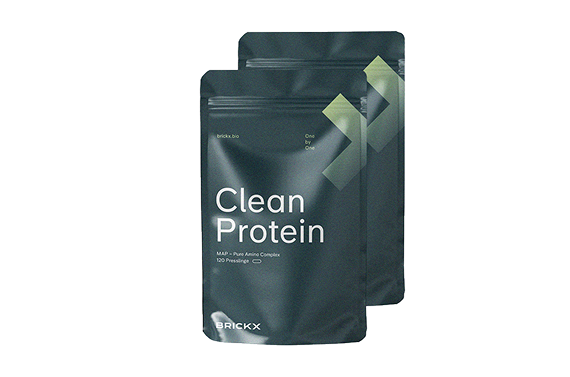MAP: What you don't find out at the gym - but your doctor should know.

1. Muscle building does not start in the shake, but in the metabolism
The body can only use proteins if they are completely broken down into bioavailable amino acids. Conventional protein - whether whey, casein or plant-based sources - has a Biological value between 16 % and 48 %, which means that the majority is excreted or converted into nitrogen compounds. MAP, on the other hand, achieves a usability of 99 % - without toxic by-products such as ammonia or urea.
2. the difference is not in the quantity, but in the quality
People who drink shakes every day often supplement blindly - in the hope that „more is more“. However, poor utilization results in metabolic waste:
-
The body has to break down the nitrogen (burden on the liver/kidneys)
-
Surpluses are stored as fat
-
Inflammatory processes can increase
MAP provides all 8 essential amino acids in the exact ratio that the body needs for protein synthesis. Without calories, without sugar, without stress - but with maximum efficiency.
3. What doctors and trainers should know
Protein deficiency is a relevant issue in medicine - especially in old age, after surgery or in cases of chronic stress. And suboptimal protein intake also affects performance, regeneration and hormone levels in sport. Nevertheless, usability is rarely discussed - neither in the gym nor in medical consultations. MAP closes this gap between sports nutrition and clinical prevention.

4 MAP in everyday life - especially for demanding bodies
Many people with high performance demands - whether at work, in training or during regeneration - underestimate how much the body relies on the availability of individual amino acids. Especially when there is a lack of time, appetite or energy to eat a protein-rich and balanced diet, shortages can occur. Conventional shakes or protein bars often provide a lot of calories, but little actual benefit at cellular level.
MAP offers a powerful and minimally invasive alternative: it does not burden the digestive tract or the metabolism, but still provides everything necessary for protein synthesis - in a precisely balanced form.
Key Takeaways:
-
MAP is ideal for Time-restricted diet, diets or fasting
-
Supported Regeneration and muscle building, without extra calories
-
Optimal for High physical or mental stress
-
No digestive stress - therefore also suitable For irritable bowel syndrome or sensitive digestion
-
Supplemented specifically for vegan/vegetarian diet or protein deficiencies
Conclusion
Muscle building, performance and regeneration do not depend solely on the amount of protein - but on what your body can really use. MAP offers a medically sound alternative to the conventional protein hype - clearly dosed, highly bioavailable and without detours.
-
Volpi, E. et al. (2003): Essential amino acids are primarily responsible for the amino acid stimulation of muscle protein anabolism in healthy elderly adults. Am J Clin Nutr.
-
Layman, D.K. (2003): The role of leucine in weight loss diets and glucose homeostasis. J Nutr.
-
Elia, M. (1991): Effect of starvation and very low calorie diets on protein-energy interrelationships in lean and obese subjects. Clin Sci.
-
Dr. Lucà-Moretti, M. (2002): A Nutritional Approach to Prevent the Syndrome of Lean Body Mass Wasting in Ageing. BMC Geriatrics.
-
Harvard Health Publishing (2020): What are amino acids and why do you need them? www.health.harvard.edu
-
Huberman Lab Podcast (2023): The Science of Muscle Growth, Recovery & Nutrition. Episode with Dr. Andy Galpin.
